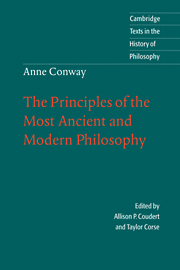Book contents
- Frontmatter
- Contents
- Acknowledgments
- Introduction
- Chronology
- Further reading
- Note on the text
- The Principles of the Most Ancient and Modern Philosophy
- Unpublished Preface by Henry More
- Published Preface
- Chapter I
- Chapter II
- Chapter III
- Chapter IV
- Chapter V
- Chapter VI
- Chapter VII
- Chapter VIII
- Chapter IX
- Index
- Cambridge Texts in the History of Philosophy
Chapter VI
Published online by Cambridge University Press: 18 November 2009
- Frontmatter
- Contents
- Acknowledgments
- Introduction
- Chronology
- Further reading
- Note on the text
- The Principles of the Most Ancient and Modern Philosophy
- Unpublished Preface by Henry More
- Published Preface
- Chapter I
- Chapter II
- Chapter III
- Chapter IV
- Chapter V
- Chapter VI
- Chapter VII
- Chapter VIII
- Chapter IX
- Index
- Cambridge Texts in the History of Philosophy
Summary
S. 1. That all creatures are mutable in respect to their natures. S. 2. To what point this mutability extends, whether to the essential nature of things or only to their attributes and modes of being? S. 3. That only the modes of being are mutable but not the essences. S. 4. That there are only three kinds of being essentially distinct from each other, namely, God, who is supreme, Christ, the mediator, and creatures, who are lowest. S. 5. That these distinctions are very necessary and protect us from falling into either of the extreme positions which are available to us – one of which is Ranterism, the other crass ignorance, both of which obscure the glory of the divine attributes. S. 6. An example of this is given. S. 7. That the justice of God gloriously appears in the transmutation of things from one species to another. S. 8. That when the human spirit changes itself through impiety into the qualities and conditions of animals, it is according to God's justice that the animal-like spirit enters the body of the animal and is punished there for some length of time. S. 9. How many erroneous ideas there are about God and how men conceive of God erroneously. S. 10. Why the world was first destroyed by water and must finally be destroyed by fire; and that all these punishments are medicinal. S. 11. That every creature is made of body and spirit, and in what way every creature, just as it has many bodies within itself, also has many spirits under one predominant general spirit, which rules all the others.
- Type
- Chapter
- Information
- Publisher: Cambridge University PressPrint publication year: 1996

